unit 6 Weather
unit 6 weather(课件)
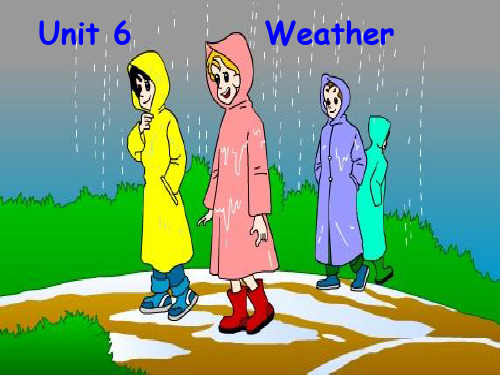
Careful readingБайду номын сангаас
Language points
• • • • • • 1.from…to… 2.turn: 半系动词 变成 eg: the leaves are turning 3.go swimming/go skating/go skiing 4.be busy doing 5.sometimes/sometime/some time/some times
My favourite season is …, because...
• Spring: cool, windy ,plant new trees • Summer: the hottest ,go to the seaside ,go swimming • Autumn: cool ,sunny but sometimes cold • Winter: very cold, snow ,go skating or skiing
sun rain
sunny rainy
cloud cloudy snow snowy
wind windy
How many seasons are there in a year?
Spring ---March to May
Summer ---June to August Autumn ---September to November
• 1.How many seasons are there in a year? • 2.What is the writer’s favourite season? • 3.Who are the busiest in the autumn?
• 1.what is the weather like in different seasons? • 2.what should people do in different seasons?
英语Unit 6 Weather Lesson 11教学设计

闽教版小学第3册英语Unit 6 Weather Lesson 11优秀教案教学设计发布者:吴虹闽教版小学《英语》第3册Unit 6 Weather Lesson 11Teaching aims and demands :1.听懂会说weather, sunny, rainy, cloudy,snowy2.听懂会说How is the weather today? It’s a sunny day. How is the weather in Beijing? It’s sunny.3培养学生能够在实际情景中运用句子谈论天气。
Emphases:1. 正确拼读sunny,rainy,cloudy,snowy2. 听懂会说How is the weather today? It’s a sunny day. How is the weather in Beijing? It’s sunny.Teaching materials:教学VCD、课件,单词卡、句型卡片。
Teaching steps :Step 1Warmmer1. Greetings: T: Good morning, boys and girls. Nice to see you again. How are you?2.Sing a song “Rain, rain, go away”Step 2.Elidation1.(由歌曲引出课题)T: Today we will learn Unit6 Weather Lesson11.(出示单词卡片,指导读音,引出课题)Step3.Presentation and drill1.T:It’s a map of China(出示课件) How is the weather in Beijing?引出sunny(以各种方式操练sunny:摇头晃脑,升降调,拼读单词)2.多种方式教授其他天气单词rainy(two by two, stop游戏),cloudy(一触即发,男女生读),snowy(升降调,row by row)3.Play a game: (1)What’s missing? (2)拍图标读单词4. Ask and answer:How is the weather in Beijing? It’s sunny. …(小组接龙)5.T:How is the weather today?(课件呈现)引出It’s a sunny/cloudy/rainy/snowy day.的回答6.自编歌谣学习sunny, sunny, a sunny day…7.Play a game: 大小声找卡片Step4.Consolidation1. Read after the VCD2. Say a rhymeStep5.Homework1.听读第11课课文和单词三遍(家长签字)2.做活动手册第11课3.将所学的有关天气的单词以及歌谣读给父母听.writing on blackboardUnit6 WeatherLesson 11How is the weather in Beijing? It’s sunny.How is the weather today? It’s a sunny da y.sunny rainy cloudy snowy(四线三格书写) 设计, 英语, Weather, 教学。
Unit6Weather(教案)闽教版英语四年级下册

Unit6 Weather (教案)闽教版英语四年级下册教学目标1. 让学生掌握关于天气的英语词汇,如:sunny, cloudy, rainy, windy等。
2. 培养学生运用英语描述天气的能力。
3. 增进学生对不同天气条件下活动的了解。
教学内容1. 关于天气的英语词汇:sunny, cloudy, rainy, windy, snowy 等。
2. 描述天气的句子结构,如:It is sunny today.3. 关于不同天气条件下的活动建议。
教学重点与难点1. 教学重点:掌握关于天气的英语词汇,能运用英语描述天气。
2. 教学难点:正确运用不同天气条件下的活动建议。
教具与学具准备1. 教具:多媒体设备,PPT,天气卡片。
2. 学具:英语课本,笔记本,彩色笔。
教学过程1. 引入:通过展示不同天气的图片,引导学生用中文描述这些天气。
2. 新课导入:介绍关于天气的英语词汇,让学生跟读并模仿。
3. 句子结构讲解:通过PPT展示句型"It is sunny today.",解释句子的构成。
4. 练习:让学生分组练习描述不同天气,教师巡回指导。
5. 活动建议:介绍不同天气条件下的活动建议,让学生讨论并分享。
板书设计1. Unit6 Weather2. 关于天气的英语词汇:sunny, cloudy, rainy, windy, snowy 等。
3. 句型:It is sunny today.4. 活动建议:在晴天可以出去玩耍,在雨天可以看书听音乐等。
作业设计1. 抄写关于天气的英语词汇。
2. 写一段关于今天天气的英语句子。
3. 列出三种不同天气条件下的活动建议。
课后反思1. 学生是否能熟练掌握关于天气的英语词汇。
2. 学生是否能正确运用句型描述天气。
3. 学生是否能根据不同天气条件提出合适的活动建议。
4. 对教学方法和教学过程的改进建议。
教学过程1. 引入利用多媒体展示不同天气的图片,如晴朗的天空、多云的天气、雨天的街道等,让学生用中文描述这些天气。
九年级义务教育2020年编四年级英语下册Unit6Weather单元综合测试卷闽教版三起

Unit6 单元测试卷一、写出下列单词的中文意思。
1. like _____________2. bike _____________3. some _____________4. home _____________5. good _____________6. goodbye _____________二、将下列单词按要求分类。
vegetable, orange, grape, noodles, apple,rice(1)(2) 食物类:___________________________________________________________三、根据图意写出英文单词。
1. ___________2. ___________3. ___________4. ___________四、选词填空,并写出句子的中文意思。
1.A. too B. please(1) Have some eggs, __________.(2) I want my breakfast, __________.2. A. tomatoes B. hamburger (1) A: Do you like _________?B: Yes, I do.(2) The __________ is nice.参考答案:一、1. 喜欢2. 自行车3. 一些4. 家5. 好6. 再见二、(1) 水果类:orange, grape, apple(2) 食物类:vegetable, noodles, rice三、2. A B赠送试卷五年级Module2T,不同F。
( )1.A. draw B. saw( )2.A.chair B.hair( )3.A.class B.pass( )4.A.teacher B.head( )5.A.why B.where二、单项选择。
( )1.She danced in a lot of _____.A.cityB.citysC.cities( )2.Did she learn any ____?A.foreign languagesB.foreign languageC.foreign English( )3.She is a ____ .A.danceB.dancerC.teach( )4.He ____ English last year.A.is learningB.learnC.learnt( )5.Ten years _____ , I was a child.A.agoB.beforeter( )6.Ms Smart learnt ___ .A.danceB.to danceC.dancing( )7.-- _______are they? --They’re my grandparents.A.WhoB.WhatC.Whose( )8. --What she yesterday? --She made a cake.A.do, didB.did, didC.did, do( )9.He ______English now.A.learningB.is learningC.learnt( ) 10.Five years ago, he _____ to school. Now he to school by bus.A.Walked, wentB.walks, goesC.walked, goes三、选答语。
四年级英语上册UNIT6LESSONWEATHER课件(闽教版)

Weather sunny rainy
26
How is the weather in Wuhan?
41
How is the weather in Lanzhou?
39
How is the weather in Dalian?
28
How is the weather in Changsha?
1
How is the weather in Shenyang?
16:30
an umbrella a rainy day
some children a snowy day
cold a sweater
hot
a fan
an umbrella a cloudy day
a sunny day a boat on the lake
1 It’s a rainy day. Two boys are playing in the rain. 2 It’s a sunny day. Some children are boating on the lake. 3 It’s a snowy day. Some children are playing in the snow.
It’s a rainy day. It’s a sunny day. It’s a snowy day. It’s a cloudyday.
How is the weather in Fuzhou?
5
How is the weather in Guangzhou?
14
How is the weather in Nanjing?
A Map of China
中职英语 语文版高一上册《Unit 6 Weather》2024年同步练习卷

语文版高一上册《Unit 6 Weather》2024年同步练习卷根据前面的英语,写出汉语意思。
(答案在后面)1.change2.hope3. reply4.cloudy5. winter6.cold7. summer8.warm9.quite10. melon11.sunny12.rainy13. vacation14. on vacation16. snowy 17. fruit 18. sports 19.wind 20. world 21. spring 22. April 23.plant 24.hometown 25. grow 26.farmer 27.seafood 28. hotel 29. autumn32.turn 33. ski 34. windy 35. May 36. flower 37. Sydney 38. sea 39. be good for 40. short 41. start 42.sweet 43. seaside 44. March 45.near48. grape49. come out50. season51.green52. skate53. heavy54. snow55.harvest56.because of57.stay58.weather根据前面的汉语,写出对应的英语单词。
(答案在后面)59. adj 绿色的n.绿色60. n.冬天,冬季61. n.海产食品,海鲜62. n.悉尼(澳大利亚城市)63.度假64. adv.相当,十分65. n.&v.收获,收割66. n.风67. n.&v.雪,下雪68.出来,长出,出现69. n.假期70. n.&v.祝愿,希望71. n.&v.回答,答复72. v.游,游泳73. n.春天,春季74. n.水果75. n.三月76. v.溜冰78. n.瓜,甜瓜79. adj.多云的80. n.田地,场地81. v.生长82. n.天气83. n.&v.雨,下雨84. adj.海滨的n.海边85. n.旅馆86. v.带来87. n.葡萄88. adj.短的89. n.开始90. n.五月91. adj.有风的92. v.滑雪94.对……有好处,有益于95. n.&adj.寒冷的,冷的96. n.植物v.栽种97.因为98. n.世界99. n.季,季节100. n.故乡101. prep.在……附近,靠近102. adj.重的,大量的103. adj.暖和的,温暖的104. n.夏天,夏季105. n.秋天,秋季106.农民107. v.改变;更换n.零钱108. n.花110. adv.从不,绝不111. adj.阳光充足的112. n.海113. n.四月114. adj.多雪的,下雪的115. v.&n.停留,居住116. v.变成,转动,翻转。
七年级英语Unit 6 It’s raining! 人教版(新目标)知识精讲

英语Unit 6 It’s raining! 人教版(新目标)【本讲教育信息】一. 教学内容:Unit 6 It’s raining!二. 语言功能:Describe the weather; Describe what you are doing描述天气;描述你在干什么三. 目标语言:1. How is the weather? It’s raining/windy/cloudy/sunny/snowing.2. What are you doing? I’m watching TV.3. What are they doing? They are studying.4. What is she/he doing? She/He is playing basketball.5. How’s it going? Great./ Not bad./Terrible./ Pretty good.四. 重点单词和词组:1. weather 天气不可数名词可用形容词bad, fine来修饰The weather is good(fine)today.练一练_______ good weather today!A. What aB. WhatC. How aD. How2. 表示天气的词rain-rainy多雨的wind-windy 有风的cloud-cloudy 多云的snow-snowy 有雪的sun-sunny 晴朗的fog-foggy 有雾的hot 热的cold 寒冷的cool 凉爽的warm 温暖的humid 潮湿的dry 干燥的练一练(1)The _____ is blowing. It’s _____.A. wind, windB. wind, windyC. windy, windyD. windy, wind(2)There _____ snow in Canada every year.A. has manyB. has muchC. are manyD. is much(3)What do you do when it________?A. rainingB. rainC. is rainyD. is rain(4)There are lots of ______(cloudy)in the sky today.The weather is _______(sun)and humid.It’s _________(rain)outside. Take the umbrella with you.3. surprised 感到惊讶的surprise 惊奇惊讶surprising令人惊讶的be surprised 感到惊讶be surprised at…对……感到惊讶He is surprised thatI can speak English. 他很惊讶我会讲英语I am much surprised at the news. 听到这消息我感到非常吃惊。
语文版中职英语基础模块上册Unit6Weather
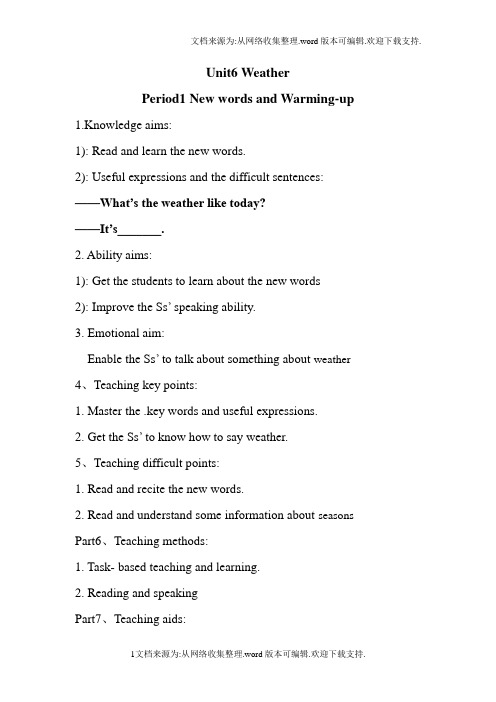
Unit6 WeatherPeriod1 New words and Warming-up 1.Knowledge aims:1): Read and learn the new words.2): Useful expressions and the difficult sentences:——What’s the weather like today?——It’s_______.2. Ability aims:1): Get the students to learn about the new words2): Improve the Ss’ speaking ability.3. Emotional aim:Enable the Ss’ to talk about something about weather 4、Teaching key points:1. Master the .key words and useful expressions.2. Get the Ss’ to know how to say weather.5、Teaching difficult points:1. Read and recite the new words.2. Read and understand some information about seasons Part6、Teaching methods:1. Task- based teaching and learning.2. Reading and speakingPart7、Teaching aids:the multimedia computer and the general teaching tools.8、Teaching steps:Step 1.GreetingsStep2.New words1)Let students read the new words by themselves.2)Read the new words before class.3)Let students read the new words after record.4)Let students read the new words after teacher.5)Let students read the new words again.Step3: Warming-up and lead-in1) ——What’s the weather like today?——It’s__fine/ cloudy/ cool/hot/ rainy/ snowy/ windy_____.2).How many seasons are there in a year?3).Which season is cool and windy?4).Which season is the hottest season?5).Which season is the harvest time?Step4 Practice——What’s the weather like today?——It’s__fine/ cloudy/ cool/hot/ rainy/ snowy/ windy_____. Step5 SummaryIn this lesson, we learn the new words of this lesson. We also knew something about weather .Step6 Homework1) Copy the new words2) Preview the next lessonStep7 Blackboard design:Unit 6 WeatherPeriod1 New words and Warming-u pStep8、Teaching Reflection(教学反思):Period2 -3 ReadingSeasonsKnowledge aims:1): Read the text seasons.2): Read and understand the text3) Find and understand the useful expressions and the difficult sentences.:2. Ability aims:1): Get the students to learn about the useful expressions and the difficult sentences.2):Improve the Ss’ reading ability.3. Emotional aim:Enable the Ss’ to know how to express their ideas about seasons 4、Teaching key points:1. Master the .key phrases and useful expressions.2. Read the text and let students give their opinion about seasons. Part5、Teaching difficult points:1. How to improve the Ss’ speaking ability.2. Read and understand the text6、Teaching methods:1. Task- based teaching and learning.2. Reading and thinking.Part7、Teaching aids:the multimedia computer and the general teaching tools.Part8、Teaching steps:Step 1.Review what we have learnt in last lessonStep 2Fast-reading1) Read the text and finish the Reading Comprehension2) Read the text after the record3) Read the text and answer the questions of .the Reading Comprehension on Page46Step 3Carefully-reading:1) Read the text again and understand the text.Step 4Language points1.from…to…2.turn3.be good for4.on vacation5.stay in6.go swimming/ shopping/ skating/ skiing/7.be happy with…Step 5 SummaryIn this lesson, we learn some useful expressions and the difficult sentences of this lesson. We also knew how to express the ideas about seasons.Step6 Homework1)Do exercise about Useful words and expressions2) Preview the next lessonStep7 Blackboard design:Unit 6 Period2 -3 ReadingSeasonsStep8、Teaching Reflection(教学反思):Period 4 Grammar:Teaching aims:1.: Knowledge aim:1): Know degrees of adjectives and adverbs2. Ability aims:1): Get the students to learn about degrees of adjectives and adverbs2): Improve the Ss’ basic knowledge of English3. Emotional aim:Enable the Ss’ to know something about degrees of adjectives and adverbs and inspire the Ss’ interest in learning English.Part4、Teaching key points:1. Master the basic rules of degrees of adjectives and adverbs.Part5、Teaching difficult point:1. Know the usages of degrees of adjectives and adverbsPart6、Teaching methods:1. Task- based teaching and learning.2. Get some detailed information by thinking.Part7、Teaching aids:the multimedia computer and the general teaching tools. Part8、Teaching steps:Step 1. GreetingsStep 2 Lead-in1.Review what we have learnt in the previous lesson2.lead inStep3. ExplanationDegrees of adjectives and adverbsGood/well better bestBad/ill worse worstMany/much more mostLittle less leastStep4 PracticeDo the exercises on Page 30Step5 SummaryIn this lesson, we reviewed the numeralsStep6 Homework1)Do exercise in Grammar Focus2) Preview the next lessonStep7 Blackboard design:Unit 6 Weather ----GrammarStep9 Teaching Reflection(教学反思)Period5----Speaking Knowledge aim:1): Talk about weather.2. Ability aims:1): Get the students to learn how to say weather2):Improve the Ss’ speaking ability.3. Emotional aim:Enable the Ss’ to talk about weather4、Teaching key points:1. Get the Ss’ to know about weatherPart5、Teaching difficult points:1. How to improve the Ss’ speaking ability.2. Make a dialogue about weather6、Teaching methods:1. Task- based teaching and learning.2. Reading and thinking.Part7、Teaching aids:the multimedia computer and the general teaching tools. Part8、Teaching steps:Step 1.GreetingsStep 2. Review what we have learnt in last lessonStep 3.SpeakingSome useful expressions:Step 4.PracticeMake some dialogues.Step 5. SummaryIn this lesson, we reviewed how to talk about weather Step 7.Homework1) Preview the next lessonStep8 Blackboard design:Unit 5 Food ----SpeakingStep9 Teaching Reflection(教学反思)。
语文版中职英语(基础模块 上册)Unit 6《Weather》ppt课件3
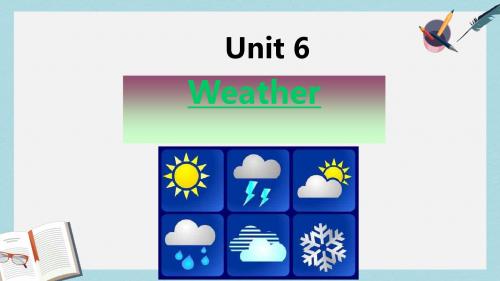
turn 是系动词,“变得”。get 也有着个用法。
In autumn, leaves turn yellow.秋天树叶变黄。
3. In the fields, everything begins to grow. 田野里,万物开始生长。
c). 重读闭音节词且只有一个辅音字母结尾时, 先双写辅音字母,再加-er或-est
原级 big hot thin fat
比较级 bigger hotter thinner fatter
最高级 biggest hottest thinnest fattest
d). 以辅音字母+y结尾的双音节词, 先改“y”为”I”, 再加-er或-est.
easily
比较级 more important
more difficult more delicious more beautiful more carefully
more easily
最高级 most important
most difficult most delicious most beautiful most carefully
8.英语12个月份的名称:January; February; March; April; May; June; July; August; September; October; November; December.
英语一周七天的名称:Monday; Tuesday; Wednesday; Thursday; Friday; Saturday; Sunday.
Unit 6
Weather
1. Spring is from March to May in my hometown. 在我的家乡,春天是从三月到五月。 from...to...从......到...... We read English from 6 to 6:30 every morning. 我们每天早晨从6点到6:30读英语。
六年级上册英语知识点手抄报1~6单元

六年级上册英语知识点手抄报1~6单元全文共3篇示例,供读者参考篇1Sixth Grade English Knowledge Points Handout 1~6 UnitUnit 1: GreetingsIn this unit, students will learn common greetings and expressions used in daily conversations. They will also practice introducing themselves and others. Students will be able to greet someone, say goodbye, ask for someone's name, and respond to questions about themselves.Key Vocabulary:- Hello- Hi- Good morning- Good afternoon- Good evening- Goodbye- What's your name?- My name is...- Nice to meet youUnit 2: Personal InformationIn this unit, students will learn how to talk about personal information. They will learn how to ask and answer questions about their age, birthday, nationality, address, and telephone number. Students will also practice spelling their names and addresses.Key Vocabulary:- How old are you?- I am ______ years old.- When is your birthday?- I was born on...- Where are you from?- I am from...- What is your address?- My address is...- What is your telephone number?- My telephone number is...Unit 3: FamilyIn this unit, students will learn how to talk about their family members. They will learn the vocabulary for family members such as parents, siblings, grandparents, aunts, and uncles. Students will also practice describing their family members in terms of appearance and personality.Key Vocabulary:- Mother- Father- Sister- Brother- Grandmother- Grandfather- Aunt- Uncle- Cousin- Family- Appearance- PersonalityUnit 4: School LifeIn this unit, students will learn how to talk about their school life. They will learn the names of school subjects, school facilities, and school activities. Students will also practice talking about their daily routine at school.Key Vocabulary:- Mathematics- English- Science- History- Geography- Physical Education- Art- Music- Classroom- Library- Gymnasium- Playground- Lunch break- HomeworkUnit 5: HobbiesIn this unit, students will learn how to talk about their hobbies and interests. They will learn the vocabulary for different hobbies such as reading, drawing, playing sports, and playing musical instruments. Students will also practice asking and answering questions about their hobbies.Key Vocabulary:- Hobby- Interest- Reading- Drawing- Painting- Swimming- Dancing- Playing soccer- Playing basketball- Playing piano- Playing guitar- Watching TV- Listening to musicUnit 6: WeatherIn this unit, students will learn how to talk about the weather. They will learn the vocabulary for different types of weather such as sunny, rainy, cloudy, windy, and snowy. Students will also practice talking about the weather forecast and describing the weather in different seasons.Key Vocabulary:- Weather- Sunny- Rainy- Cloudy- Windy- Snowy- Forecast- Season- Spring- Summer- Autumn/Fall- Winter- Temperature- HumidityOverall, these knowledge points will help students develop their English speaking and listening skills in various everyday situations. By mastering these vocabulary and expressions, students will be able to communicate effectively in English and expand their vocabulary.篇2Sixth Grade English Knowledge PosterUnit 11. Greetings and Introductions- Good morning/afternoon/evening - What's your name?- My name is...- How are you?- I'm fine, thank you.2. Numbers 1-1003. Alphabet and Spelling- A - Z- How do you spell...?- Can you repeat that, please?Unit 21. Family members- Father- Mother- Brother- Sister- Grandfather- Grandmother2. Ages3. Personal Pronouns- I, you, he, she, it, we, theyUnit 31. Colors- Red, blue, green, yellow, orange, purple, pink, black, white 2. Shapes- Circle, square, triangle, rectangle3. Describing Objects- Big, small, tall, short, long, short, heavy, lightUnit 41. Weather- Sunny, rainy, cloudy, windy, snowy2. Clothing- Shirt, pants, dress, skirt, shoes, socks, hat, jacket3. Seasons- Spring, summer, fall, winterUnit 51. Animals- Dog, cat, fish, rabbit, bird, elephant, lion, tiger, bear- Wild animals vs. domestic animals2. Habitats- Forest, ocean, desert, jungle, farm3. Verbs- Run, jump, swim, fly, crawl, walk, eat, sleep, drink, playUnit 61. Places in the Neighborhood- School, park, post office, grocery store, library, hospital2. Directions- Straight, turn left, turn right, go ahead, stop, on the corner, across from3. Prepositions- In, on, at, under, over, betweenIn conclusion, these are the key English knowledge points covered in the sixth-grade textbooks for Units 1~6. Mastering these concepts will provide a solid foundation for further English language learning.篇3Title: English Knowledge Points Handwritten Report for Grade Six Book One, Units 1-6Unit 1: Greetings and Introductions- Basic greetings: Hello, Hi, Good morning, Good afternoon, Good evening, Goodbye- Introducing oneself and others: My name is..., What's your name?, Nice to meet youUnit 2: Classroom Objects- Classroom objects: pen, pencil, ruler, eraser, book, desk, chair, blackboard, whiteboard- The use of articles: a, an, the- Asking and answering questions about objects in the classroomUnit 3: Family Members- Family members: mother, father, sister, brother, grandmother, grandfather, aunt, uncle, cousin- Possessive pronouns: my, your, his, her, our, their- Asking and answering questions about family membersUnit 4: Colors and Clothes- Colors: red, blue, yellow, green, orange, purple, black, white- Clothes: shirt, dress, skirt, pants, T-shirt, shoes, socks, hat, jacket- Describing clothes using colors and patternsUnit 5: Daily Activities- Daily activities: get up, eat breakfast, go to school, have classes, do homework, play sports, watch TV, go to bed- The present simple tense: I get up at 7 o'clock, She goes to school by bus- Talking about daily routinesUnit 6: Weather and Seasons- Weather: sunny, cloudy, rainy, windy, snowy- Seasons: spring, summer, autumn, winter- Asking and answering questions about the weather and seasonsConclusion:In the first six units of the Grade Six Book One English curriculum, students learn essential vocabulary related to greetings, classroom objects, family members, colors, clothes, daily activities, weather, and seasons. They also practice basic grammar structures such as possessive pronouns, articles, and the present simple tense. By mastering these knowledge points, students will be able to communicate effectively in various everyday situations and build a solid foundation for further English language learning.。
英语基础模块unit6weather测试题上课讲义

英语基础模块u n i t6w e a t h e r测试题基础模块(上)Unit6 测试题I.语音知识:从A、B、C、D四个选项中找出其划线部分与所给单词划线部分读音相同的选项(15个15分)。
1. A. summer B. sunny C. farmer D. lovely2. A. Green B. windy C. swim D. winrer3. A. Flower B. snow C. cold D. go4. A. cloudy B. flowre C. about D. following5. A. rainy B. spring C. skate D. say6. A. sports B. cloud C. because D. short7. A. hotel B. hope C. cold D. world8. A. seaside B. quite C. field D. repiy9. A. weather B. March C. child D. reach10. A. season B. skate C. stay D. change11.A. sea B. swim C. heavy D. harvest12.A. sunny B. summer C. honey D. start13.A. plant B. sun C. harvest D. farmet14.A. seafood B. ski C. rainy D. sweet15.A. melon B. autumn C. snow D. vacationII.单项选择:(30个30分)从A、B、C、D中选择最佳答案16.Spring is ____ March ____ May in my hometown. A.back;to B.from;to C.to;for D.to;for17.There are ______ seasons in a year.A.oneB.twoC.threeD.four18.In the fileds,everything__________ to grow.A.beginB.beginsC.beginningD.began19.Trees turn green and flowers start to _____.e oute upe backe in20.Summer comes after spring.It’s __________ season in a year.A.the hottestB. the hotterC. hottestD. hotter21.Trees are ____ our world.A.bad forB.bad toC.good forD.good for22.The weather in winter ____ and the daysA.gets cooler;get shorterB.gets cooler;gets shorterC.get cooler; gets shorterD.get cooler; get shorter23.Farmers are very ____ with their good harvrst in autumn.A.pleasureB.happyC.crazyD.fond24. I often go to the seaside on vocation with my friends_______ summer。
授课——课文Unit 6 Weather

Unit 6 WeatherWarming up1.What's the weather like today?It's_fine cold cool hot warmsunny cloudy rainy snowy windy——————————————————————————————————————44spring summer autumn winterwarm hot cool coldgreen rainyrain cloudyflower swim ReadingSeasonsThere are four seasons in a year.They are spring,summer,autumn and winter.Spring is from March to May in my hometown.It is quite cooland windy in spring.In the fields,everything begins to grow.Treesturn green and flowers start to come out.We usually plant new trees in April.Trees are good for our world.Many people like spring becauseit brings hope.Summer comes after spring.It's the hottest season in a year.It(图片)often rains in summer.I love this time of year.I often go to the seasideon vacation with my friends in summer.We stay in a small hotel nearthe sea and go swimming every day.When it rains,I read somethingor watch TV.We have a lot of seafood there.Summer is my favorite season.Autumn is a very busy season.It is the harvest time of a year.Allthe farmers are very busy in the fields.The weather gets cooler andthe days get shorter.It's usually sunny but sometimes cold in autumn. Farmers are very happy with their good harvest in autumn.It's very cold in winter,but I like winter very much.It snows a lotin my hometown.Sometimes we go skating or skiing.We have a lot of interesting sports in winter.——————————————————————————————————————45Reading ComprehensionFill in the blanks with the right information from the text"Seasons" to complete the following statements.1.Spring is from _____ to ____in my hometown.2.The weather is_________in spring in my hometown.3.In my hometown,we usually plant new trees_____.4.Many people like spring because_____.5.I often _______________ on vacation with my friends in summer.6._______is the harvest time in a year.7.Farmers are _______in the fields in autumn.8.Farmers are very happy with _______________.9.In winter,it _____ a lot and we have a lot of _____. Language Studyeful Words and ExpressionsComplete the following sentences with the correct form of theevery day.2.We all like Mary _________ she is a hardworking student.3.Hello,boys and girls!Let's ______to read the text of Unit 3.4.Swimming is my ________ sport.5.My parents want to _____ in a hotel near our school.6.Smoking ____ not______ your health.7.Please ______ your new books here tomorrow.8.Not all of us _____ pop music.-------------------------46 Unit 6 Weather 9.Sorry,I can not help you do it now because I am too____.10.We _______ help the farmers plant new trees in spring.II.Grammar Focus1.Write down the comparative degree forms and superlative degree forms of the following adjectives and adverbs.Small ______ ______ high ______ ______fine ______ ______ early ______ ______thin ______ ______ big ______ ______easy ______ ______ much ______ ______well ______ ______ little ______ ______happily ______ ______ popular ______ ______2.Fill in the blanks with the right degree of the adjectives or adverbs in brackets.1)The book is not as______(thick)as that one.2)Get up______(early)tomorrow,or you'll be late again.3)The third question is_____(difficult)of the four.4)Renmin Park is one of_____(beautiful)parks in this city.5)Which is______(large),China or Canada?6)Mary's room is______(big)than Kate's.7)Mike is_____(clever)than Jack,but Jack studies____(hard)than Mike.8)The red box is much______(heavy)than the yellow one.9)China is one of the______(large)countries in the world.10)-How are you today?-I am______(well)now.Thank you.-------------------------47Comprehensive Language SkillListeningBruce is studying in China.Now he is talking with his mother on the phone.Fill in the blanks according to what you have heard.Bruce:Hello!Mum?This is Bruce.Mum:Oh,hello,Bruce!,Mum.What about you?Bruce:Mum:Fine,too.What'slike in Beijing?Bruce:Beijing?I'm not in Beijing now.I'm in Xinjiang.Mum:Oh,really?You're in Xinjiang.the weather there?Bruce:Yeah.It'sin the morning,but it turnsat noon.The fruit here is very sweet becauseit's.I like the grapes and melons very much.Mum,what's the weather like at home now?Mum:It's_.And everything is OK here.Bruce:HaveMum:Bruce:Bye,Mum!Mum:Bye!SpeakingTalking about the WeatherSome useful expressions:How's the weather today?It's a fine day. What's the weather like today?It's fine/rainy/cold/cool/hot/How's the weather in New York?warm/cloudy.What's the weather like in Beijing?|It's a lovely day today.It's a fine day today,isn't it?Yes,it is.48 Unit 6 Weather第3页文字识别结果:Talk about today's weather with your partner after the model.The useful expressions above may help you.ther on thModel 1:d.Li Lei:Hi!It's a fine day today,isn't it?Liu Tao:Yes,it is.Where are you going?Li Lei:I want to go swimming.Please gowith me together.Liu Tao:Sorry,I can't.I'm very busythese days.er there?rnsModel 2:owiousmoe vet ey an wonbecauseMary:How is the weather today?y muchJane:It's fine but rather cold.Mary:Where are you going?Jane:I'm going skating with my friends.Mary:Have a good time.Jane:Thank you.Bye.Mary:Bye.2wO2WritingThis is a letter from your pen-pal in Sydney.Please read the letter. DearGreetings from Sydney!Now I'm writing to tell you something about the weatherin Sydney.The weather here is quite different from that in your hometown.It is very hot in summer here.In winter;it is not cold but quite warm.The weather in Sydney changes in a day.In the morning, iot/it may be sunny,but in the afternoon,we may have heavy rains.In winter;,it rains a lot but never snows and beautiful flowers are everywhere.Winter is the best season here.When it is winter here,it 49第4页文字识别结果:is summer in your hometown.Do you want to come here for a vioin I just want to go to visit your hometown.What is the weather liko your hometown in winter?Looking forward to your reply.Say hello to my friends in you school.All the best!YoursDavidNow,write your reply.Some words have been given to help you. Dear David,Thank you for your letter Now I'm writing to tell you whatwinter in my hometown.In winter here,inSometimes__cold,It snowsheavyand snow everywhere.students and children goiceafter school.When you come here,you may learn to do winter sports.Welcome to_We are waiting for you.Best Wishes!Yours。
最新闽教版小学英语四年级下册unit 6 weather pb 习题及答案
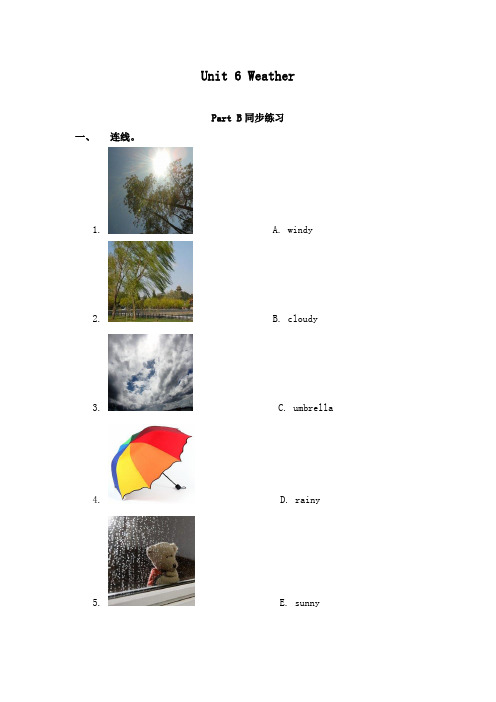
Unit 6 WeatherPart B同步练习一、连线。
1. A. windy2. B. cloudy3. C. umbrella4. D. rainy5. E. sunny二、英汉互译。
1.today ____________2.take_____________3.雨伞 ___________4.晴朗的 __________5.cloudy ___________三、根据情景选择正确的一项。
1. 你想知道今天是什么天气,你可以说:A. How is the weather today?B. What is the weather today?2. 你看见今天的天气很晴朗,你可以说:A. It’s sunny.B. It’s cloudy.3. 妈妈害怕会下雨,于是她对你说:A. It’s raining.B. Take an umbrella with you.4. 你看见外面云彩很多,你会说:A. It’s cloudy.B. It’s windy.5. 你看见外面刮风了,你会说:A. It’s cloudy.B. It’s windy.四、选出不同类的一项。
1. A. sunny B. cloudy C. take2. A. today B. cold C. warm3. A. sixty B. umbrella C. ninety4. A. rain B. weather C. snow5. A. take B. chicken C. beef五、写句子。
1.今天的天气怎么样,琳达?2.多云天气。
3.给你带一件大衣。
4.晚上可能会下雪。
5.广州今天的天气怎么样?参考答案:一、1-5 EABCD二、1.今天 2.带走 3.umbrella 4.sunny 5.多云的三、1-5 AABAB四、1-5 CABBA五、1. How is the weather today, Linda?2. It’s cloudy.3. Take a coat with you.4. It may snow in the evening.5. How is the weather today in Guangzhou?。
Unit 6 Weather职高英语基础模块(上)第6单元课件

Weather
ห้องสมุดไป่ตู้
Words about Seasons and Weather
spring, summer, autumn, winter, warm, cool, hot, cold, sun, sunny, wind, windy, cloud, cloudy, rain, rainy, snow, snowy, fine, lovely…
Writing
Talk about the weather in you hometown
4. Many people like spring because it brings
hope.
5. I often go to the seaside on vocation with
my friends in summer.
Useful structures in the text 2
6. Summer is my favorite season.
Important Phrases
in the fields turn green come out plant trees be good for every day watch TV go to the seaside go swimming go skating go skiing because of on vocation be happy with
very much.
10. We have a lot of interesting sports in
winter.
形容词和副词的比较级和最高级的构成 1. 词尾加 -er 或 -est 2. 词尾加 -r 或 -st 3. 双写词尾再加 -er 或 -est 4. 变 y 为 i 再加 -er 或 –est 5. 在词前加 more 或 most 6. 不规则变化
最新四年级英语下册Unit6《Weather》(PartA) 2(新版)闽教版优选教学课件

Review
• 1.复习单词卡片:snow/rain/warm/cold
• 2.复习句子
(1)How is the weather in Beijing/Fuzhou?
翻译:北京/福州天气怎么样?
It's raining, but it's warm. 在下雨,但是很暖和。
讲解:rain:下雨 train:火车
warm:暖和 [wɔːm] but:表示转折,“但是”
Game:猜单词
O
cold/coat/boat/foot/door
d
cold/need/hand/head
课文巩固
• 1.Listen and follow
• 2.分角色模仿课文对话 boys:Sally's father girls:Sally
巩固训练
It's snowing.
It's cold.
巩固训练
It's warm.
巩固训练
巩固训练
It's snowing.
It's warm.
巩固训练
It's cold.
巩固训练
It's raining.
我曾试过收起那些东西甚至屏蔽一切与你有关的东西。直到最后,我不得不承认,用心爱过的人,就连忘记也需要格外用力。 最近在抖音上被这样一句话刷屏了:“以后我们的关系就这样吧,如果接下来的日子里你不找我,那么我也不会主动找你,直到慢慢的没有交集。你的微信我不会删,电话也不会删,因为毕竟我们爱过。如果你给我发消息我还是会秒回你。但是没有任何期待了。我会放下手机继续等待。如果你来,我还是会原地等你,但这次我不知道会等多久,因为等一个人的期限是有限的,我也说不出你哪里好?只是你给了我别人给不了的感觉。”
unit6Weather中职基础模块教案

Unit6 WeatherPeriod1 New words and Warming-up1.Knowledge aims:1): Read and learn the new words.2): Useful expressions and the difficult sentences:——What’s the weather like today?——It’s_______.2. Ability aims:1): Get the students to learn about the new words2): Improve the Ss’ speaking ability.3. Emotional aim:Enable the Ss’ to talk about something about weather 4、Teaching key points:1. Master the .key words and useful expressions.2. Get the Ss’ to know how to say weather.5、Teaching difficult points:1. Read and recite the new words.2. Read and understand some information about seasons Part6、Teaching methods:1. Task- based teaching and learning.2. Reading and speakingPart7、Teaching aids:the multimedia computer and the general teaching tools.8、Teaching steps:Step 1.GreetingsStep2.New words1)Let students read the new words by themselves.2)Read the new words before class.3)Let students read the new words after record.4)Let students read the new words after teacher.5)Let students read the new words again.Step3: Warming-up and lead-in1) ——What’s the weather like today?——It’s__fine/ cloudy/ cool/hot/ rainy/ snowy/ windy_____.2).How many seasons are there in a year?3).Which season is cool and windy?4).Which season is the hottest season?5).Which season is the harvest time?Step4 Practice——What’s the weather like today?——It’s__fine/ cloudy/ cool/hot/ rainy/ snowy/ windy_____. Step5 SummaryIn this lesson, we learn the new words of this lesson. We also knew something about weather .Step6 Homework1) Copy the new words2) Preview the next lessonStep7 Blackboard design:Unit 6 WeatherPeriod1 New words and Warming-u pStep8、Teaching Reflection(教学反思):Period2 -3 ReadingSeasonsKnowledge aims:1): Read the text seasons.2): Read and understand the text3) Find and understand the useful expressions and the difficult sentences.:2. Ability aims:1): Get the students to learn about the useful expressions and the difficult sentences.2):Improve the Ss’ reading ability.3. Emotional aim:Enable the Ss’ to know how to express their ideas about seasons4、Teaching key points:1. Master the .key phrases and useful expressions.2. Read the text and let students give their opinion about seasons.Part5、Teaching difficult points:1. How to improve the Ss’ speaking ability.2. Read and understand the text6、Teaching methods:1. Task- based teaching and learning.2. Reading and thinking.Part7、Teaching aids:the multimedia computer and the general teaching tools.Part8、Teaching steps:Step 1.Review what we have learnt in last lessonStep 2 Fast-reading1) Read the text and finish the Reading Comprehension2) Read the text after the record3) Read the text and answer the questions of .the Reading Comprehension on Page46Step 3 Carefully-reading:1) Read the text again and understand the text.Step 4Language points1.from…to…2.turn3.be good for4.on vacation5.stay in6.go swimming/ shopping/ skating/ skiing/7.be happy with…Step 5 SummaryIn this lesson, we learn some useful expressions and the difficult sentences of this lesson. We also knew how to express the ideas about seasons.Step6 Homework1)Do exercise about Useful words and expressions2) Preview the next lessonStep7 Blackboard design:Unit 6 Period2 -3 ReadingSeasonsStep8、Teaching Reflection(教学反思):Period 4 Grammar:Teaching aims:1.: Knowledge aim:1): Know degrees of adjectives and adverbs2. Ability aims:1): Get the students to learn about degrees of adjectives and adverbs2): Improve the Ss’ basic knowledge of English3. Emotional aim:Enable the Ss’to know something about degrees of adjectives and adverbs and inspire the Ss’interest in learning English. Part4、Teaching key points:1. Master the basic rules of degrees of adjectives and adverbs. Part5、Teaching difficult point:1. Know the usages of degrees of adjectives and adverbs Part6、Teaching methods:1. Task- based teaching and learning.2. Get some detailed information by thinking.Part7、Teaching aids:the multimedia computer and the general teaching tools.Part8、Teaching steps:Step 1. GreetingsStep 2 Lead-in1.Review what we have learnt in the previous lesson2.lead inStep3. ExplanationDegrees of adjectives and adverbs2. 少数不规则变化Good/well better best Bad/ill worse worst Many/much more most Little less least Step4 PracticeDo the exercises on Page 30Step5 SummaryIn this lesson, we reviewed the numerals Step6 Homework1)Do exercise in Grammar Focus2) Preview the next lessonStep7 Blackboard design:Unit 6 Weather ----GrammarStep9 Teaching Reflection(教学反思)Period5----Speaking Knowledge aim:1): Talk about weather.2. Ability aims:1): Get the students to learn how to say weather2):Improve the Ss’ speaking ability.3. Emotional aim:Enable the Ss’ to talk about weather4、Teaching key points:1. Get the Ss’ to know about weatherPart5、Teaching difficult points:1. How to improve the Ss’ speaking ability.2. Make a dialogue about weather6、Teaching methods:1. Task- based teaching and learning.2. Reading and thinking.Part7、Teaching aids:the multimedia computer and the general teaching tools. Part8、Teaching steps:Step 1.GreetingsStep 2. Review what we have learnt in last lessonStep 3.SpeakingSome useful expressions:Step 4.PracticeMake some dialogues.Step 5. SummaryIn this lesson, we reviewed how to talk about weather Step 7.Homework1) Preview the next lessonStep8 Blackboard design:Unit 5 Food ----SpeakingStep9 Teaching Reflection(教学反思)。
语文版中职英语(基础模块 上册)Unit 6《Weather》ppt课件1
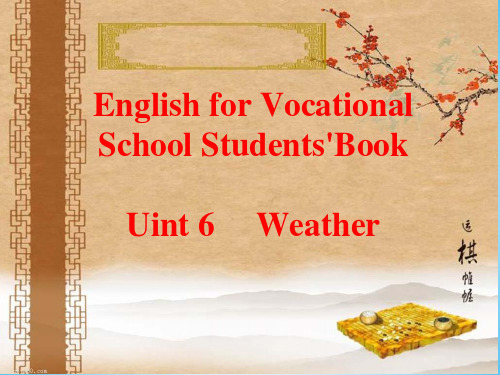
能力目标
• (1)能够用英语简单谈论天气情况——说。 • (2)能阅读课文并理解课文意思——读。 • (3)培养信息查找﹑筛选和归纳总结的能力——读。
• (4)通过分组的学习方式,培养学生与他人沟通 交流和 分工合作的能力。
(设计意图):中职生学习英语重在实用; 对中职生职业教育本身的特点。
情感目标:
3. 你知道英国人是什么情况下谈论天气的吗?
Do you know when and where the english people talk about the weater? (给学生介绍英国人如何谈论天气,拓展学生的外延知识)
活动2 头脑风暴
snowy snow rain rainy
shower showery cloud cloudy
取简单易懂,贴近学生日常生活的方式和内容,才会调动学生 的学习积极性,学生才会很乐意参与到其中。
2.老师讲课的内容不局限与课本知识,适当的课外背景知识,有
利于学生对课文的理解,也扩展了学生的外延知识。
学生的积极性。
3.英语学习用头脑风暴方法,运用了学生发散思维,充分调动了
【存在的问题】:1. 【创新之处】:
巩固练习
• 学生做 languange study 的 练习题
总结和布置家庭作业
1. 要求学生做课后的知识点练习 2. 老师总结这节课所讲的知识点。
3. 布置作业 :
老师在黑板上给出一些关键词,要求学 生写一篇关于“我最喜欢的季节” 的作 文。
教学反思与板书设计 1.在中职英语课中,课文导入是教学中一个很重要的部分,要选
老师提问:
1. 今天天气怎样?(要学生看窗外的天气)
How is the weather today? it is sunny/..... (随意叫个别学生来操练,练习英语口语,体现情境教学法和操 练法)
Unit 6 Weather课件(含对应习题答案)-2021-2022学年中职英语语文版基础模块上册

8. Farmers are very happy with___t_h_e_ir__g_o_o_d h_a_r_v_e_s_t_i_n__a_u_t_u_m__n___.
9.In winter, it a lot and we have a lot of __i_n_t_e_re__s_ti_n_g__s_p_o__rt.s
Sometimes we go skating or skiing.
We have a lot of interesting sports in winter.
冬季非常冷,但我非常喜欢冬季。 在我的家乡经常下雪。 有时我们去滑冰或滑雪。 我们在冬季进行许多有趣的运动。
Fill in the blanks with the right information from the
在我的家乡,春季是从三月到五月。 天气相当凉爽并多风。 田地里,万物开始生长。 树变绿了,花也开始长出来了。 我们通常在四月植树。 树有益于我们的世界。 许多人喜欢春季,因为它带来希望。
Reading
Paragraph Three 3.Which season is the writer’s favorite? 4.What does the writer often do with his
begin
3.Hello,boys and girls! Let’s ___ቤተ መጻሕፍቲ ባይዱ______to
4.Swimming is my __fa_v_o_r_it_e__sport. 5.My parents want to ___s_ta_y_ in a hotel near our schiosol. good for 6.Smoking _b_r_inogt ________ your health. 7.Please _______li_k_e your new books here tomorrow. 8.Not all of us _____ pboupsymusic . 9.Sorry , I ocaftnennot help you do it now because I am too ________.
- 1、下载文档前请自行甄别文档内容的完整性,平台不提供额外的编辑、内容补充、找答案等附加服务。
- 2、"仅部分预览"的文档,不可在线预览部分如存在完整性等问题,可反馈申请退款(可完整预览的文档不适用该条件!)。
- 3、如文档侵犯您的权益,请联系客服反馈,我们会尽快为您处理(人工客服工作时间:9:00-18:30)。
•需要注意的几个问题:
1、比较级前用much,even,far,a lot,a little,any等修饰,表示程度。
eg:Tom is much taller than Jim. ---Mom, I was late for school this morning. ---You’d better get up a little eariler tomorrow.
4、比较级+ and + 比较级
eg:
1. Our country is getting stronger and stronger.
2. It’s becoming more and more difficult to find a job in big cities now.
5、比较级+ than any other +单数名词
4. 以 “辅音字母+y”结尾的双音节词,先改“y”为“i”, 再加-er 或-est.
early-earlier-earliest
thirsty-thirstier-thirstiest
5.部分双音节词或多音节词前面加more ,most.如:
interesting
famous 原级
more interesting
三、固定短语
1、more or less (或多或少) eg: It’s an hour’s journey, more or less. 2、more than(多于) eg: We have more than ten questions to ask.
3、less than(少于) eg:My son is less than one meter tall. 4、sooner or later(迟早) eg: She will come here sooner or later. 5、no longer (不再) eg: He’s no longer a student.
1.How many seasons are there in a year? 2.Which season is cool and windy? 3.Which season is the hottest season? 4.Which season is the harvest time?
in+月份/季节 在…月/…季 on+某一天 在某一天
cloudy
How is the weather?
sunny
How is the weather?
rainy / raining
How is the weather today?
snowy / snowing
sun
sunny
1.The_____ sun is shining today
sunny The weather today is______.
He’s taller than any other student in our class. =He’s the tallest student in our class.
6、Which / Who +…+比较级,A or B? eg: ---Which one is more popular, the radio or the movie? ---The movie is.
Make snowman
——What’s the weather like today? ——It’s_______.
n.
sun cloud wind rain snow
adj.
sunny cloudy windy rainy snowy
How is the weather?
windy
How is the weather?
farther further farthest
old
older elder oldest eldest
Exercises
一。将下列各组形容词变为比较级 和最高级 1.tall strong old rge fine late
3. big hot thin 4. easy busy happy 5. beautiful dangerous comfortable
more famous 比较级
most interesting
most famous
最高级
good/well
bad/ill little far
better
worse less
best
worst
两好、
两坏、
两多、 一少、 furthest 一远、 一老.
many/much #43; 比较级 + of the two结构
eg:he’s the taller of the two. 3、the + 比较级, the + 比较级 eg:
The more you eat,the fatter you are. The busier he is, the happier he feels.
• Children's Day is ___ on 1. June
• Children’s Day is ___June. in
形容词比较级最高级规则
1. 一般情况下加-er 或-est : young-yonger-yongest old –older -oldest tall-taller -tallest small-smaller -smallest 2. 以字母e结尾的形容词,加-r 或- st nice –nicer-nicest safe –safer -safest 3. 重读闭音节词只有一个辅音字母时,应先双写辅音字母, 再 加-er或-est. big—bigger -biggest fat—fatter-fattest
二.用所给词的正确形式填空。 1.John is the _______boy in the class. (clever) 2.Her bicycle is _________than mine. (good) 3.This question is _______than the other one. (simple) 4._______ late than never. (good) 5.Jim is ill, but he is __________ now. (well) 6.Be ________________next time. (careful) 7.The day is growing _____________.(hot)
It’s a good day for school trip.
rain
rainy
2.It’s a________ rainy day. rain is very The______ heavy
cloud
cloudy
cloudy 3.It’ll be_______. There are many________in the clouds sky.
in March,April and May.
It’s warm in spring.
We
fly kites in spring.
in June,July and August.
Summer
It’s hot in summer.
We go swimming in summer.
Autumn
Weather
What’s the weather like (today)? How is the weather?
seasons and months
• There are 4 seasons in a year. • There are 12 months in a year.
Spring
in September, October, November.
It’s cool in autumn.
We have big harvest in autumn.
Winter
in December, January , Febrary.
It’s cold in winter.
Throw snowballs
snow snowy
snowy 4.It’ll be_______. There are _______on snow the ground.
wind
windy
wind blows hard. 5.The _______
windy It’ll be_______ .
Review of the text
